|
|
|
Sort Order |
|
|
|
Items / Page
|
|
|
|
|
|
|
| Srl | Item |
| 1 |
ID:
147998
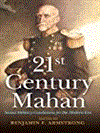

|
|
|
|
|
| Publication |
Annapolis, Naval Institute Press, 2013.
|
| Description |
179p.pbk
|
| Standard Number |
9781612512433
|
|
|
|
|
|
|
|
|
|
|
|
Copies: C:1/I:0,R:0,Q:0
Circulation
| Accession# | Call# | Current Location | Status | Policy | Location |
| 058844 | 359.4/ARM 058844 | Main | On Shelf | General | |
|
|
|
|
| 2 |
ID:
131492
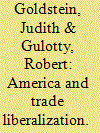

|
|
|
|
|
| Publication |
2014.
|
| Summary/Abstract |
Among scholars, delegation of power to the US president in 1934 is widely believed to have been a necessary requisite for tariff reductions in ensuing years. According to conventional wisdom, delegation to the president sheltered Congress from constituent pressure thereby facilitating the opening of the US economy and the emergence of the United States as a world power. This article suggests a revision to our understanding of just how that occurred. Through a close study of the US tariff schedule between 1928 and 1964, focusing on highly protected products, we examine which products were subject to liberalization and at what time. After 1934, delegation led to a change in trade policy, not because Congress gave up their constitutional prerogative in this domain but because presidents were able to target the potential economic dislocation that derives from import competition to avoid the creation of a congressional majority willing to halt the trade agreements program.
|
|
|
|
|
|
|
|
|
|
|
|
|
|
|
|
| 3 |
ID:
131993
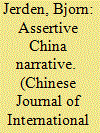

|
|
|
|
|
| Publication |
2014.
|
| Summary/Abstract |
Dissenting assaults on the conventional wisdom that China's foreign policy became more 'assertive' in 2009-2010 have intensified. In this article I develop this revisionist critique in three ways. First, to make the most valid and cumulative assessment of the accuracy of the 'assertive China narrative' to date, I conceptualise its key empirical claim as a case of the general phenomenon of 'foreign policy change'. Second, based on this framework, I present a range of new empirical evidence that, taken as a whole, strongly challenges the notion of a new Chinese assertiveness. Third, since academic China and Asia experts played a pivotal role in creating the narrative, I raise a comprehensive explanation of why a great many scholars so strikingly went along with the flawed idea.
|
|
|
|
|
|
|
|
|
|
|
|
|
|
|
|
| 4 |
ID:
107598


|
|
|
|
|
| Publication |
2011.
|
| Summary/Abstract |
Most pundits argue the eurozone has only two options: break up or create a fiscal union to match its monetary one. In fact, there's a third, and better, path: adopt tighter market discipline, bailing out illiquid countries while letting truly insolvent ones go bust. The result would be a collection of fitter economies and a Europe strong enough to play a big role on the world stage.
|
|
|
|
|
|
|
|
|
|
|
|
|
|
|
|
| 5 |
ID:
116495


|
|
|
|
|
| Publication |
2012.
|
| Summary/Abstract |
Drawing on the fast growing literature concerning Chinese development and transition, we sketch a general framework for understanding the 'China Miracle' that the 'conventional wisdom' and 'Washington Consensus' cannot fully explain. Reflecting upon the recent financial crisis and the subsequent worldwide economic downturn, an attempt is made to present a paradigm, inspired by Chinese practice over the past decades, from a historical perspective. We conjecture that a desirable China model may maintain the characteristics of a good economy as proposed in Phelps (2006) with full employment and rights to personal development. With regard to the functioning of freely competitive markets and macroeconomic policy, not only should a China model be able to mimic the rule of law and accountability of liberal western democracies, but it might also possess a mainstream ideology that is deeply rooted in Chinese culture with modern social sciences as theoretical foundations. To divest China of undesirable properties from the existing system, it is necessary to establish a principle-agent relationship that can provide stable governance structure for day-to-day efficient management of the economy and society, and protect the fundamental interests of its citizens when external challenges threaten to weaken social cohesion and political stability.
|
|
|
|
|
|
|
|
|
|
|
|
|
|
|
|
| 6 |
ID:
168062
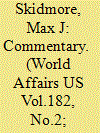

|
|
|
|
|
| Summary/Abstract |
This article directly and bluntly challenges traditional thought by casting aside conventional wisdom regarding the national economy, replacing it with Modern Political Economy and Public Policy. American national policies, I argue, should always, whenever possible, be universal, not targeted toward specific groups. Moreover, policies need to be crafted to achieve their goals, not to fit within budgetary constraints. The least government is the worst, not the best, and a miserly approach to spending is not “wise use of the taxpayers’ dollars.” The national government controls the currency, paying its bills in dollars. It issues dollars as needed, in whatever amount it chooses, and is unrestrained by the need to “find the money” or “pay-as-you-go.” Taxes are useful for purposes of regulation and control of income inequality, but are not relevant to expenditures. “Anything that is technically feasible,” I claim following Kelton and coauthors, “is financially affordable,” and there is no need to fear inflation so long as spending does not exceed the productive capacity of the economy. Despite conventional wisdom to the contrary, and regardless of the widely used jargon of politicians, when government spends, it is not using “The Taxpayers’ Money.”
|
|
|
|
|
|
|
|
|
|
|
|
|
|
|
|
| 7 |
ID:
133955
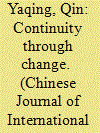

|
|
|
|
|
| Publication |
2014.
|
| Summary/Abstract |
The 'assertive China discourse' has become a widespread narrative in the United States and certain other countries, and there is a parallel narrative in China. It argues that China has abandoned the taoguangyanghui (Keeping a low profile) strategy and adopted that of fengfayouwei (Striving for achievements), especially since 2009. This article, taking background knowledge as the most important factor of an agent's thinking and doing, argues that the Zhongyong dialectic constitutes a core component of background knowledge on the Chinese. It holds that a strident turn from one strategy to the other is inadvisable, and indeed continuity through change is a realistic description of China's present international strategy. It implies the existence of both continuity and change, although the former is its main theme with regards to strategic goals, designs, and policies as a whole. Changes, however, do occur, mainly through issues perceived as relevant to core national interests. The textual analysis in this article provides support for this argument, but offers little to substantiate the 'assertive China discourse'. Also worthy of note is that it is easy to use such changes to infer a revolutionary turn in China's international strategy, as the 'assertive China discourse' has done, as it fits perfectly into the embedded Hegelian dichotomous structure under the background of a realist tragedy of major power politics. Such an interpretation, however, is both biased and dangerous, because it attempts to turn a constructed narrative into a conventional wisdom. This could potentially culminate in a self-fulfilling prophet of the zero-sum struggle in a Hobbesian jungle, particularly between China and the United States.
|
|
|
|
|
|
|
|
|
|
|
|
|
|
|
|
| 8 |
ID:
138551
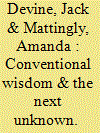

|
|
|
|
|
| Summary/Abstract |
Despite our inability to anticipate or predict it, intelligence analysts across the public and private sector are constantly on the lookout for the next Unknown. In fact, the role of the intelligence community is to identify future threats, collating all the intel available on potential crisis areas and then backing it up with state-of-the-art computer capacity and robust human analysis rooted in expertise from every corner of the globe.
|
|
|
|
|
|
|
|
|
|
|
|
|
|
|
|
| 9 |
ID:
121003
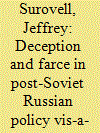

|
|
|
|
|
| Publication |
2012.
|
| Summary/Abstract |
Of all the assumptions pervading the conventional wisdom about Russian foreign policy few have been more universally accepted than Russia's supposed opposition to NATO expansion. Because Russia's principal source of profit has come from rental value of natural resources from the world market, Russia's foreign policy has largely been conducted in the interests of the exporters of those resources. Compliance with NATO expansion, Moscow's decision-makers apparently believe, can only promote the pecuniary interests of that group. Given this dynamic, and confirmed by an examination of the historical record, I conclude that Moscow's leaders have acquiesced to and even supported NATO expansion.
|
|
|
|
|
|
|
|
|
|
|
|
|
|
|
|
| 10 |
ID:
090368
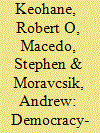

|
|
|
|
|
| Publication |
2009.
|
| Summary/Abstract |
International organizations are widely believed to undermine domestic democracy. Our analysis challenges this conventional wisdom, arguing that multilateral institutions can enhance the quality of national democratic processes, even in well-functioning democracies, in a number of important ways: by restricting the power of special interest factions, protecting individual rights, and improving the quality of democratic deliberation, while also increasing capacities to achieve important public purposes. The article discusses conflicts and complementarities between multilateralism and democracy, outlines a working conception of constitutional democracy, elaborates theoretically the ways in which multilateral institutions can enhance constitutional democracy, and discusses the empirical conditions under which multilateralism is most likely to have net democratic benefits, using contemporary examples to illustrate the analysis. The overall aim is to articulate a set of critical democratic standards appropriate for evaluating and helping to guide the reform of international institutions.
|
|
|
|
|
|
|
|
|
|
|
|
|
|
|
|
| 11 |
ID:
102562
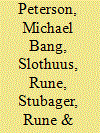

|
|
|
|
|
| Publication |
2011.
|
| Summary/Abstract |
Public attitudes towards welfare policy are often explained by political values and perceptions of deservingness of welfare recipients. This article addresses how the impact of values and perceptions varies depending on the contextual information that citizens have available when forming welfare opinions. It is argued that whenever citizens face deservingness-relevant cues in public debate or the media, a psychological 'deservingness heuristic' is triggered prompting individuals spontaneously to think about welfare policy in terms of who deserves help. This is an automatic process, equally influential among the least and the most politically sophisticated. Moreover, when clear deservingness cues are present, the impact of values on opinions vanishes. These arguments are supported by data from two novel experimental studies embedded in separate nationwide opinion surveys. The findings revise conventional wisdom of how values and heuristics influence public opinion and have major implications for understanding dynamics in aggregate welfare opinion and attempts from political elites to manipulate public opinion.
|
|
|
|
|
|
|
|
|
|
|
|
|
|
|
|
| 12 |
ID:
132508
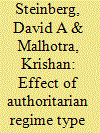

|
|
|
|
|
| Publication |
2014.
|
| Summary/Abstract |
Conventional wisdom holds that autocracies are more likely than democracies to adopt interventionist and protectionist economic policies, including fixed and undervalued exchange rates. This article suggests that this view is only partially correct: nondemocracies are a heterogeneous grouping, and only some types of authoritarian regimes adopt different foreign economic policies from those of their democratic counterparts. Using the example of exchange rate policy, the authors show that foreign economic policy varies across monarchic, military, and civilian dictatorships. More specifically, they hypothesize that monarchies and military regimes are more likely than democracies and civilian dictatorships to maintain fixed exchange rate regimes because the former regimes have smaller "selectorates" than the latter. The authors also expect that monarchies and civilian dictatorships maintain more undervalued exchange rates than democracies and military regimes because the former regimes provide their leaders with greater tenure security than the latter regimes. These hypotheses are evaluated using a time-series-cross-sectional data set of a large sample of developing countries from 1973 to 2006. The statistical results accord with these predictions. These findings indicate that the ways in which democracies engage with the global economy may be less unique than many believe.
|
|
|
|
|
|
|
|
|
|
|
|
|
|
|
|
| 13 |
ID:
123621


|
|
|
|
|
| Publication |
2013.
|
| Summary/Abstract |
Conventional wisdom holds that large margins of electoral victory contribute to presidential power. How does this variation in power impact U.S. foreign policy? I argue here that presidents who win elections by a substantial margin authorize the use of substantial military force more regularly, but do so at the expense of personal diplomacy and low-level crisis engagement. This distinction stems from the variation in the external constraint that other political actors place on these policies. New presidents who are empowered by a decisive election have more leverage and are therefore better able to pursue otherwise constrained foreign policies such as the use of major force. In contrast, those who win by smaller margins have less political capital and are forced disproportionately to the less constrained arenas of diplomacy and crisis intervention.
|
|
|
|
|
|
|
|
|
|
|
|
|
|
|
|
| 14 |
ID:
123295


|
|
|
|
|
| Publication |
2013.
|
| Summary/Abstract |
Many people point to high profile failures like 9/11 and Iraq as indicators that CIA's analytic performance is inadequate or flawed. Flawed by design.1 A legacy of ashes.2 A culture of failure.3 Or so goes the conventional wisdom. Fortunately this conventional wisdom is wrong. These so-called failures more accurately represent the perennial dilemmas and tradeoffs associated with the analytic function and, most importantly, the inappropriate expectation that these observers hold of CIA's ability to prevent surprises. As a matter of fact, there is much that people do not fully understand about the CIA.
|
|
|
|
|
|
|
|
|
|
|
|
|
|
|
|
| 15 |
ID:
124868


|
|
|
|
|
| Publication |
2013.
|
| Summary/Abstract |
Five prevailing myths about India's nuclear posture should be dispelled, exposing its posture as no longer as minimalist as the conventional wisdom asserts with significant, underappreciated implications for safety, regional security, and crisis stability.
|
|
|
|
|
|
|
|
|
|
|
|
|
|
|
|
| 16 |
ID:
127165
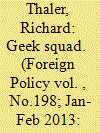

|
|
|
| 17 |
ID:
111789
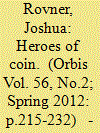

|
|
|
| 18 |
ID:
132942
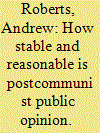

|
|
|
|
|
| Publication |
2014.
|
| Summary/Abstract |
The quality of democracy depends on both politicians and citizens. While most attention has focused on politicians, this paper looks at citizens. There has been some scepticism about whether the postcommunist public is prepared to rule their countries. The legacies of communism and the rigours of the transition may have produced citizens whose opinions are unstable and ill-informed and therefore a poor basis for democratic policy making. This paper tests this proposition by considering the nature of public opinion in the Czech Republic. Its main conclusion is that postcommunist public opinion is more reasonable than conventional wisdom suggests. Opinions on most policies change slowly if at all and when they do change the changes are prompted more by gradual shifts in mores than by political manipulation. This suggests that citizens in the region are prepared to have a significant voice in policy making.
|
|
|
|
|
|
|
|
|
|
|
|
|
|
|
|
| 19 |
ID:
185324
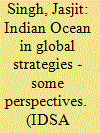

|
|
|
| 20 |
ID:
132401


|
|
|
|
|
| Publication |
2014.
|
| Summary/Abstract |
Indonesia is often regarded as the natural leader of the Association of Southeast Asian Nations (ASEAN) in light of its geographical dimensions, large population, strategic position and natural resources. The country has felt entitled to a position of leadership and has generally been recognized by the other ASEAN members as first among equals. While the de facto leadership of Indonesia has traditionally been accepted as conventional wisdom, little attention has been given to the extent to which Jakarta has actually succeeded in exercising leadership in ASEAN and how its attempt to do so has been perceived by the other Southeast Asian states. The paper explores this question by focusing on Indonesia's ability to provide international public goods in the areas of security and economics, engage in conflict management and promote institution building. It argues that the country has sought to establish a stable and autonomous security environment, to conduct conflict meditation efforts in the Cambodian conflict and the South China Sea disputes, and to develop institutional mechanisms to promote security, democracy and human rights among other issues. Still, Indonesia's leadership in ASEAN has been incomplete due to resistance from some members to its preference for an autonomous regional order and in recent years a democratic form of domestic governance. Its leadership has so far also been limited to the political and security spheres, leaving other sectors, like the economy, to others.
|
|
|
|
|
|
|
|
|
|
|
|
|
|
|
|
|
|
|
|
|